-
 Bitcoin
Bitcoin $83,978.2329
-0.95% -
 Ethereum
Ethereum $1,574.6532
-2.89% -
 Tether USDt
Tether USDt $1.0000
0.01% -
 XRP
XRP $2.0799
-2.09% -
 BNB
BNB $582.0978
-0.45% -
 Solana
Solana $126.8891
-1.65% -
 USDC
USDC $0.9999
0.01% -
 TRON
TRON $0.2520
1.40% -
 Dogecoin
Dogecoin $0.1531
-1.65% -
 Cardano
Cardano $0.6042
-2.72% -
 UNUS SED LEO
UNUS SED LEO $9.4073
0.49% -
 Chainlink
Chainlink $12.1781
-1.60% -
 Avalanche
Avalanche $18.8470
-3.21% -
 Stellar
Stellar $0.2342
-2.01% -
 Toncoin
Toncoin $2.8527
-3.56% -
 Shiba Inu
Shiba Inu $0.0...01173
-1.28% -
 Sui
Sui $2.0691
-3.34% -
 Hedera
Hedera $0.1571
-2.40% -
 Bitcoin Cash
Bitcoin Cash $319.5878
-1.46% -
 Litecoin
Litecoin $74.6635
-1.14% -
 Polkadot
Polkadot $3.5374
-1.49% -
 Dai
Dai $1.0001
0.01% -
 Hyperliquid
Hyperliquid $15.5398
-0.20% -
 Bitget Token
Bitget Token $4.3223
0.51% -
 Ethena USDe
Ethena USDe $0.9992
0.01% -
 Pi
Pi $0.6040
-9.29% -
 Monero
Monero $217.4800
1.03% -
 Uniswap
Uniswap $5.1331
-2.98% -
 OKB
OKB $51.4640
-0.05% -
 Pepe
Pepe $0.0...07120
0.41%
What is a Perpetual contract and how is it different from futures?
Perpetual contracts, unlike futures, have no expiration, using funding rates to align with spot prices, offering flexibility but also high risk due to leverage.
Apr 11, 2025 at 07:56 pm
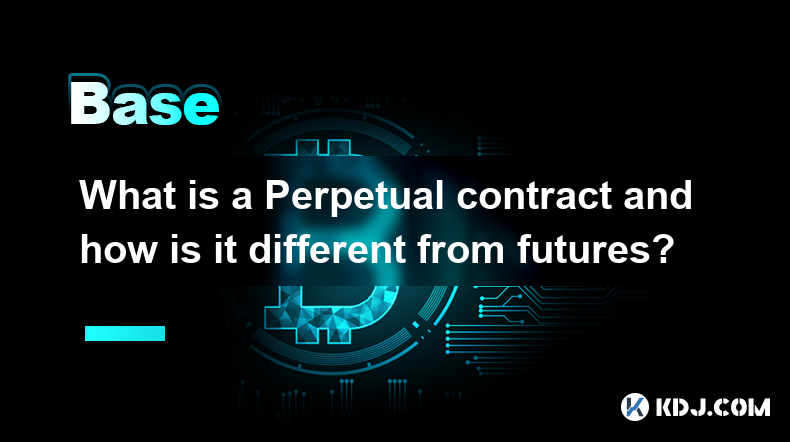
A perpetual contract, also known as a perpetual swap or perpetual futures, is a type of derivative product in the cryptocurrency market that allows traders to speculate on the price of an underlying asset without an expiration date. Unlike traditional futures contracts, which have a set expiration date, perpetual contracts can be held indefinitely, providing traders with more flexibility in their trading strategies.
Perpetual contracts are designed to mimic the price movements of the underlying asset as closely as possible. They achieve this through a mechanism called the funding rate, which is periodically exchanged between long and short positions to ensure that the perpetual contract's price remains closely aligned with the spot price of the underlying asset. If the funding rate is positive, long position holders pay short position holders, and if it's negative, short position holders pay long position holders.
In contrast, futures contracts are agreements to buy or sell an asset at a predetermined price on a specific future date. These contracts have a fixed expiration date, after which they must be settled. Futures contracts are commonly used for hedging against price volatility or for speculative trading. The key difference between futures and perpetual contracts lies in their expiration: futures have a set expiration date, while perpetual contracts do not.
Trading mechanics of perpetual contracts involve margin trading, where traders can open positions with a fraction of the total contract value. This leverage can amplify both gains and losses, making it a high-risk, high-reward trading instrument. Traders can go long (betting on price increases) or short (betting on price decreases) on perpetual contracts, similar to futures.
The funding rate in perpetual contracts is a critical component that differentiates them from futures. It is calculated based on the difference between the perpetual contract's market price and the spot price of the underlying asset. The funding rate is typically exchanged every 8 hours, though this can vary depending on the exchange. This mechanism helps to prevent the perpetual contract's price from deviating too far from the spot price.
Key Differences Between Perpetual Contracts and Futures
Expiration Date: The most significant difference between perpetual contracts and futures is the expiration date. Futures contracts have a set expiration date, requiring traders to either settle the contract or roll it over to a new contract. Perpetual contracts, on the other hand, do not expire, allowing traders to hold positions indefinitely.
Funding Rate: Perpetual contracts use a funding rate mechanism to align their price with the spot price of the underlying asset. Futures contracts do not have this mechanism, as their price is determined by the market's expectation of the asset's future price at the expiration date.
Settlement: Futures contracts are settled at expiration, either through physical delivery of the asset or cash settlement. Perpetual contracts, since they do not expire, are not subject to settlement in the same way. Instead, traders can close their positions at any time, and the funding rate mechanism ensures that the contract's price remains aligned with the spot price.
Liquidity and Trading Volume: Perpetual contracts often have higher liquidity and trading volume compared to futures contracts, especially in the cryptocurrency market. This is because perpetual contracts offer more flexibility and can be traded around the clock without the need to worry about expiration dates.
How to Trade Perpetual Contracts
Trading perpetual contracts involves several steps and considerations. Here's a detailed guide on how to get started:
Choose a Trading Platform: Select a reputable cryptocurrency exchange that offers perpetual contracts. Popular platforms include Binance, Bybit, and FTX. Ensure the platform is secure and offers the assets you want to trade.
Fund Your Account: Deposit funds into your trading account. Most exchanges support deposits in cryptocurrencies like Bitcoin or Ethereum, as well as fiat currencies in some cases.
Understand Leverage: Decide on the amount of leverage you want to use. Leverage can amplify your gains but also your losses, so it's crucial to understand the risks involved. Most platforms allow you to adjust your leverage before opening a position.
Open a Position: Navigate to the perpetual contract section of the exchange and select the asset you want to trade. Decide whether you want to go long or short, and enter the amount you wish to trade. Confirm your order and monitor your position.
Monitor the Funding Rate: Keep an eye on the funding rate, as it can impact your position's profitability. If the funding rate is high, it may be more costly to hold a long position, and vice versa for short positions.
Manage Risk: Use stop-loss and take-profit orders to manage your risk. These orders can help you limit potential losses and lock in profits. Adjust these orders as the market moves to protect your position.
Close Your Position: When you're ready to exit your trade, close your position by selling if you're long or buying if you're short. Ensure you understand any fees associated with closing your position.
Advantages of Perpetual Contracts
Flexibility: Perpetual contracts offer traders the flexibility to hold positions indefinitely, without the need to worry about expiration dates. This can be particularly advantageous for traders who want to maintain long-term positions.
Liquidity: Due to their popularity, perpetual contracts often have higher liquidity than futures contracts, making it easier to enter and exit positions at favorable prices.
No Expiration Risk: Since perpetual contracts do not expire, traders do not face the risk of having to roll over their positions to new contracts, which can sometimes result in slippage or other costs.
Close Tracking of Spot Price: The funding rate mechanism ensures that perpetual contracts closely track the spot price of the underlying asset, providing a more accurate reflection of the market's current valuation.
Risks of Perpetual Contracts
Leverage Risk: The use of leverage in perpetual contracts can amplify both gains and losses. Traders must be cautious and use risk management tools to protect their capital.
Funding Rate Costs: The funding rate can be a significant cost, especially if it remains high for an extended period. Traders need to factor this into their trading strategy and be prepared to pay or receive funding payments.
Market Volatility: The cryptocurrency market is known for its volatility, which can lead to significant price swings. Traders must be prepared for rapid changes in market conditions and adjust their positions accordingly.
Counterparty Risk: Trading perpetual contracts involves counterparty risk, as you are trading against other market participants. Ensure you use a reputable exchange with strong security measures to mitigate this risk.
Frequently Asked Questions
Q: Can I trade perpetual contracts on any cryptocurrency exchange?
A: Not all cryptocurrency exchanges offer perpetual contracts. You should check the specific offerings of each exchange to see if they support perpetual contracts for the assets you want to trade.
Q: How often is the funding rate calculated and paid?
A: The funding rate is typically calculated and paid every 8 hours, though this can vary depending on the exchange. Always check the specific details of the exchange you are using.
Q: What happens if I cannot meet a margin call on my perpetual contract position?
A: If you cannot meet a margin call, your position may be liquidated by the exchange to cover the losses. This is why it's crucial to manage your leverage and use risk management tools effectively.
Q: Are perpetual contracts suitable for beginners?
A: Perpetual contracts can be complex and involve significant risk due to leverage. Beginners should thoroughly understand the mechanics and risks involved before trading perpetual contracts. It's often recommended to start with spot trading or less leveraged products before moving to perpetual contracts.
Disclaimer:info@kdj.com
The information provided is not trading advice. kdj.com does not assume any responsibility for any investments made based on the information provided in this article. Cryptocurrencies are highly volatile and it is highly recommended that you invest with caution after thorough research!
If you believe that the content used on this website infringes your copyright, please contact us immediately (info@kdj.com) and we will delete it promptly.
- Panama City Council Votes to Allow Citizens to Pay Taxes Using Bitcoin and Other Cryptocurrencies
- 2025-04-17 01:35:13
- Bitcoin Dominance Reaches 62.2% as Macroeconomic Headwinds Batter Digital Assets
- 2025-04-17 01:35:13
- Bitcoin (BTC) Centered on $84,000 at the April 16 Wall Street Open Amid Hopes That a Weak US Dollar Would Fuel a Bull Market Comeback
- 2025-04-17 01:30:13
- Ethereum Is Bitcoin's True Vision
- 2025-04-17 01:30:13
- Bitcoin Design Community Announces Designathon 2025, a Two-Week Global Online Event Aimed at Transforming the User Experience of Bitcoin
- 2025-04-17 01:25:14
- BNB ecosystem completes another quarterly burn, incinerating tokens worth nearly $1M
- 2025-04-17 01:25:14
Related knowledge

What does Floor Price mean in the NFT market
Apr 17,2025 at 12:42am
The term Floor Price is a critical concept within the NFT (Non-Fungible Token) market, serving as a key indicator for both buyers and sellers. In essence, the floor price represents the lowest price at which an NFT from a particular collection is currently listed for sale on a marketplace. This price point is crucial for understanding the perceived valu...
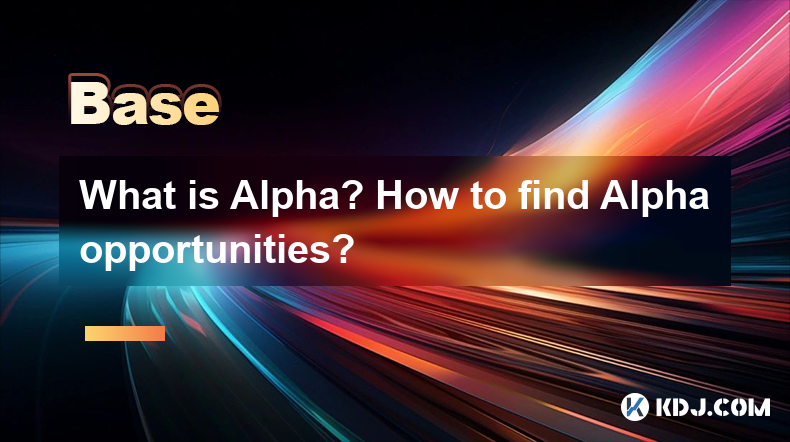
What is Alpha? How to find Alpha opportunities?
Apr 16,2025 at 12:42pm
What is Alpha?Alpha is a term widely used in the financial world, including the cryptocurrency market, to describe the ability of an investment to outperform a benchmark. In the context of cryptocurrencies, alpha refers to the excess return an investor achieves over the market's average return. For example, if the overall crypto market grows by 10% in a...
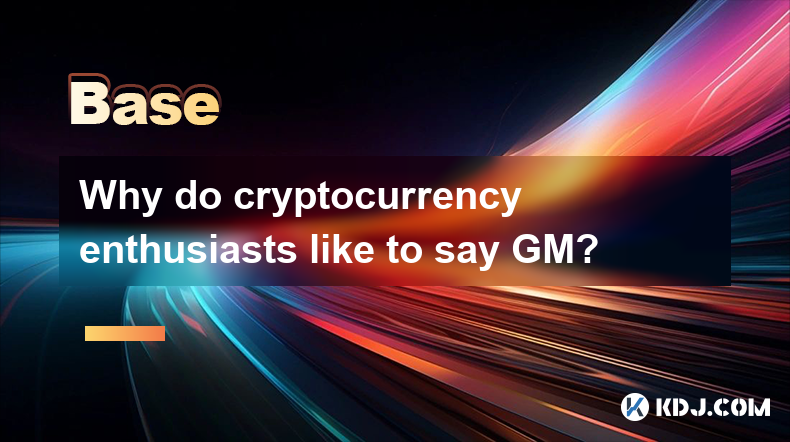
Why do cryptocurrency enthusiasts like to say GM?
Apr 16,2025 at 06:21am
In the world of cryptocurrency, the term 'GM' has become a popular greeting among enthusiasts. GM stands for 'Good Morning,' and its widespread use within the crypto community has a deeper significance than just a simple greeting. This article delves into the reasons why cryptocurrency enthusiasts like to say GM, exploring its origins, cultural signific...

What do WAGMI and NGMI mean?
Apr 16,2025 at 08:08pm
In the world of cryptocurrency, you might often come across the acronyms WAGMI and NGMI. These terms have become part of the crypto slang and are frequently used in discussions, tweets, and forums related to digital currencies. Let's delve into what these terms mean, their origins, and how they are used within the crypto community. Understanding WAGMIWA...
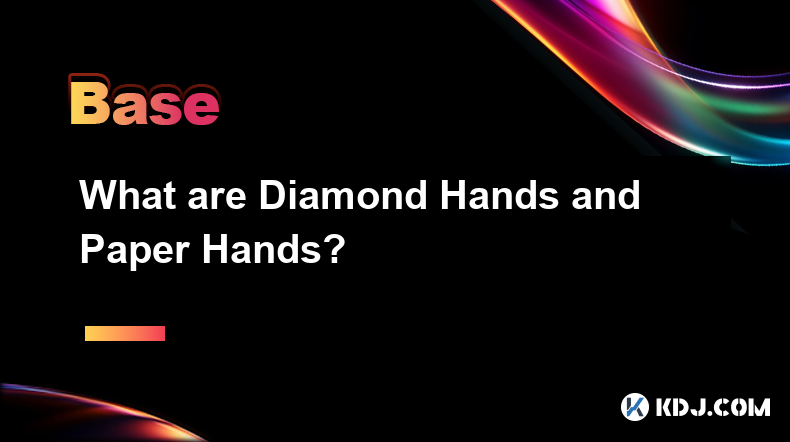
What are Diamond Hands and Paper Hands?
Apr 16,2025 at 10:42am
In the world of cryptocurrencies, the terms Diamond Hands and Paper Hands are frequently used to describe the behavior and mindset of investors, particularly in volatile markets. These terms originated from online communities and have become a significant part of the crypto lexicon, often used to describe the level of resilience and commitment an invest...
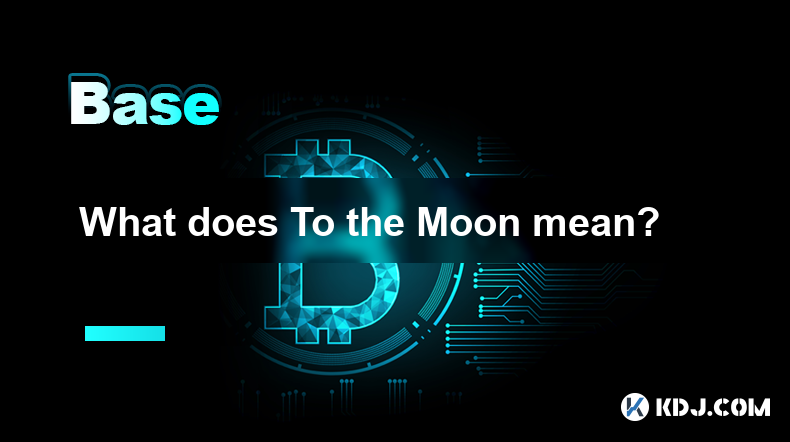
What does To the Moon mean?
Apr 16,2025 at 10:35pm
What does 'To the Moon' Mean?In the world of cryptocurrency, the phrase 'To the Moon' is a popular expression that captures the enthusiasm and optimism of the crypto community. It signifies a strong belief in the potential of a particular cryptocurrency to experience a significant increase in value. When someone says a cryptocurrency is going 'To the Mo...

What does Floor Price mean in the NFT market
Apr 17,2025 at 12:42am
The term Floor Price is a critical concept within the NFT (Non-Fungible Token) market, serving as a key indicator for both buyers and sellers. In essence, the floor price represents the lowest price at which an NFT from a particular collection is currently listed for sale on a marketplace. This price point is crucial for understanding the perceived valu...

What is Alpha? How to find Alpha opportunities?
Apr 16,2025 at 12:42pm
What is Alpha?Alpha is a term widely used in the financial world, including the cryptocurrency market, to describe the ability of an investment to outperform a benchmark. In the context of cryptocurrencies, alpha refers to the excess return an investor achieves over the market's average return. For example, if the overall crypto market grows by 10% in a...

Why do cryptocurrency enthusiasts like to say GM?
Apr 16,2025 at 06:21am
In the world of cryptocurrency, the term 'GM' has become a popular greeting among enthusiasts. GM stands for 'Good Morning,' and its widespread use within the crypto community has a deeper significance than just a simple greeting. This article delves into the reasons why cryptocurrency enthusiasts like to say GM, exploring its origins, cultural signific...

What do WAGMI and NGMI mean?
Apr 16,2025 at 08:08pm
In the world of cryptocurrency, you might often come across the acronyms WAGMI and NGMI. These terms have become part of the crypto slang and are frequently used in discussions, tweets, and forums related to digital currencies. Let's delve into what these terms mean, their origins, and how they are used within the crypto community. Understanding WAGMIWA...

What are Diamond Hands and Paper Hands?
Apr 16,2025 at 10:42am
In the world of cryptocurrencies, the terms Diamond Hands and Paper Hands are frequently used to describe the behavior and mindset of investors, particularly in volatile markets. These terms originated from online communities and have become a significant part of the crypto lexicon, often used to describe the level of resilience and commitment an invest...

What does To the Moon mean?
Apr 16,2025 at 10:35pm
What does 'To the Moon' Mean?In the world of cryptocurrency, the phrase 'To the Moon' is a popular expression that captures the enthusiasm and optimism of the crypto community. It signifies a strong belief in the potential of a particular cryptocurrency to experience a significant increase in value. When someone says a cryptocurrency is going 'To the Mo...
See all articles























































































